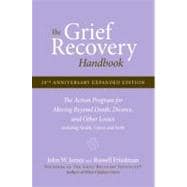About This Book
The Grief Recovery Handbook: The Action Program for Moving Beyond Death, Divorce, and Other Losses (20th Anniversary Expanded Edition)
ISBN: 9780061686078
This classic resource has been a cornerstone for those navigating the complex journey of grief for over two decades. Written by John W. James and Russell Friedman, two seasoned experts in grief recovery, this book offers a comprehensive guide to help individuals move beyond loss and towards recovery and happiness.
Who Uses It?
Primarily, this book is used by individuals who have experienced significant losses such as the death of a loved one, divorce, or other major life changes. It is also a valuable resource for professionals in the field of bereavement counseling and support groups. The book's practical approach makes it accessible to anyone seeking to understand and manage their grief.
History and Editions
First published in 1989, The Grief Recovery Handbook has undergone significant updates to commemorate its 20th anniversary. This expanded edition includes new material addressing specific challenges such as loss of faith, career and financial issues, health problems, and growing up in an alcoholic or dysfunctional home. The book's enduring popularity stems from its ability to provide actionable steps for those struggling with unresolved grief.
Author and Other Works
John W. James and Russell Friedman have dedicated their careers to helping people recover from grief. They have served as consultants to thousands of bereavement professionals and provide Grief Recovery Seminars and Certification Programs throughout the United States and Canada. Their work at the Grief Recovery Institute has made them leading authorities in the field of grief recovery.
Detailed Information
ISBNs and Formats
Hardcover: ISBN-13: 9780061686078
eTextbook: ISBN-13: 9780061686085 (The ebook for "The Grief Recovery Handbook" is available right here on eCampus.com!)
eTextbook: ISBN-13: 9780061686092 (The ebook for "The Grief Recovery Handbook" is available right here on eCampus.com!)
Paperback: ISBN-13: 0061686100
Rental Options: Available through eCampus.com with various rental durations
Publication Details
Publisher: William Morrow Paperbacks
Publication Date: 2009
Number of Pages: 192
Language: English
Item Weight: 7 ounces
Dimensions: 8.00 x 5.25 inches
Other Editions and Formats
10th Anniversary Edition: Available through eCampus.com
Related ISBNs:
9780061686115
9780061686122
0061686139
Note: The information provided is accurate as of the current date and is subject to change based on new editions or formats released by the publisher.









